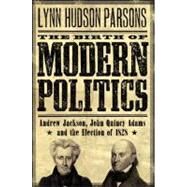The Birth of Modern Politics Andrew Jackson, John Quincy Adams, and the Election of 1828
, by Parsons, Lynn Hudson- ISBN: 9780199754243 | 0199754241
- Cover: Paperback
- Copyright: 7/19/2011
The 1828 presidential election, which pitted Major General Andrew Jackson against incumbent John Quincy Adams, has long been hailed as a watershed moment in American political history. It was the contest in which an unlettered, hot-tempered southwestern frontiersman, trumpeted by his supporters as a genuine man of the people, soundly defeated a New England "aristocrat" whose education and political rÚsumÚ were as impressive as any ever seen in American public life. It was, many historians have argued, the country's first truly democratic presidential election. Lynn Hudson Parsons argues also that the election not only marks the beginning of nationally organized party competition, but introduced to an expanded electorate a host of novel campaign tactics, including coordinated media, get-out-the-vote efforts, organized rallies and parades, opinion polling, campaign emblems and paraphernalia, appeals to ethnic groups, and "opposition research." In The Birth of Modern Politics, Parsons shows that the Adams-Jackson contest began a national debate that is eerily contemporary, pitting those whose cultural, social, and economic values were rooted in community action for the common good against those who believed the common good was best served by giving individuals as much freedom as possible to promote their own interests. It offers fresh and illuminating portraits of both Adams and Jackson and reveals how, despite their vastly different backgrounds, they had started out with many of the same values, admired one another, and had often been allies in common causes. Both were staunch nationalists, and both shared an aversion to organized parties and "electioneering." But by 1828, caught up in a shifting political landscape, they were plunged into a competition that separated them decisively from the Founding Fathers' era and ushered in a style of politics that is still with us today.







